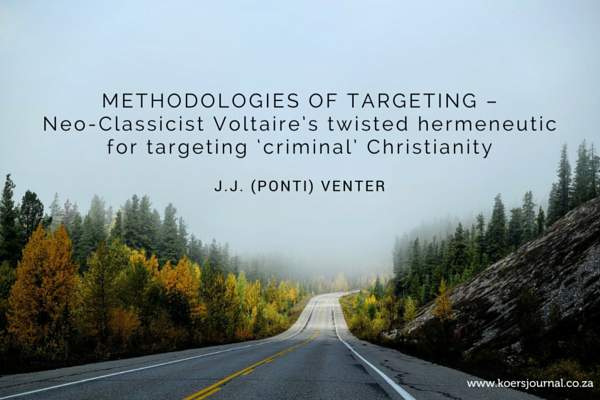Abstract
ABSTRACTThis article is the third of four written to line up two extremes in the history of methodology: early 20th century Pragmatism and late-Renaissance militarism, filling in the middle period, focusing on Voltaire and the atmosphere before the French revolution. Pragmatist William James pretended to offer a purely formal method, yet strategized it as a doctrinal attack on the inefficiency of Christianity (according to his (mis)understanding of it). Machiavelli attacked Christianity’s practice of justice and meekness as weakness, from his own Classicist, Romanist militaristic empire perspective. Voltaire, in middle Modernity, devised a hermeneutic from an Enlightenment position with a strong Neo-Classicist slant, by representing Ancient Classical tradition as fundamentally tolerant to difference of opinion, and by over-painting any suggestion that early Christians were persecuted for their faith. He represented the Christians of his own days (often rightly so) as unfair, criminal and violent, especially with regard to heterodox opinions. His naturalistic tendencies, contradicting his liberalism (an intolerant propagation of tolerance) must have contributed to the severity of persecution of non-compliant Christians during the 1789 Revolution. Later naturalistic liberalists, such as Dide and Booms, and several anti-Christian sites on the internet, found and find their inspiration (sometimes against his intentions) in Voltaire’s criticism of Christianity. KeywordsApologetics, tolerance, Neo-Classicism, Vico, book, hermeneutics, practicalism, Nature, Reason, statism, peace OPSOMMINGHierdie artikel is die derde van vier, geskryf vanuit twee historiese ekstreme: vroeg-20e-eeuse Pragmatisme en laat-Renaissance militarisme. Dit vul die middelperiode in met artikels gefokus op Voltaire en die wysgerige konteks voor die Franse Rewolusie. Pragmatis William James het die pretensie van ‘n suiwer formele metode voorgehou, maar dit strategies ingevul as ‘n doktrinêre aanval op die oneffektiwiteit van die Christendom (volgens sy eie (wan-)verstaan daarvan). Machiavelli het die Christendom se beoefening van geregtigheid en sagmoedigheid as swakheid aangeval, uit sy eie Klassistiese, Romanistiese, militaristiese ryksperspektief. Voltaire, in middel-Moderniteit, het ‘n hermeneutiek uit ‘n Verligtingsperspektief ontwerp, sterk Neo-Klassisisties, deur die Antieke Klassieke tradisie as fundamenteel tolerant teenoor meningsverskil voor te stel en deur enige suggestie dat vroeë Christene oor hulle geloof vervolg is, toe te smeer. Tegelykertyd het hy die Christene van sy tyd (dikwels tereg) voorgestel as onregverdig, krimineel en gewelddadig, veral teenoor afwykende menings. Sy naturalistiese neigings, wat sy liberalisme weerspreek (‘n intolerante propagering van toleransie), moes bygedra het tot die skrikwekkende vervolging van oninskiklike Christene gedurende die 1789 Rewolusie. Latere naturalistiese liberaliste, soos Dide en Booms en verskeie anti-Christelike blaaie op die internet, het hulle inspirasie gevind (soms teen sy intensie) in Voltaire se kritiek op die Christendom.SleutelwoordeApologetiek, toleransie/verdraagsaamheid, Neo-Klassisisme, Vico, boek, hermeneutiek, praktikalisme, Natuur, Rede, statisme, vrede_20.png) https://doi.org/10.19108/KOERS.80.3.2238
https://doi.org/10.19108/KOERS.80.3.2238

This work is licensed under a Creative Commons Attribution-NoDerivatives 4.0 International License.
Copyright (c) 2016 J.J. (Ponti) Venter

